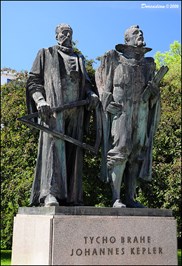Science
Related: About this forumAstronomy in a parallel universe
Parallel universes, from branes to the many-worlds interpretation of quantum mechanics, are popular among theoretical physicists. This means that "what-if" scenarios in history are not entirely contrary to fact; they merely contradict the facts in our particular universe.
Consider the following example. In the late sixteenth century, Tycho Brahe observed a certain sixth-magnitude star. Continuing to observe this star over several years, Tycho made the startling discovery that it moved relative to the "fixed stars". Eureka, he had discovered a new planet! Since the discovery took place at his famous observatory Uraniborg, Tycho decided to call the planet "Uranus". Other astronomers were shocked at the news. Many of them couldn't see Uranus at all - they lacked the keen eyesight that Tycho was famous for. Some went so far as to deny the existence of Uranus, branding it a hoax. In time, other astronomers verified that Uranus was real, and the scholarly world came to accept its existence.
When the old king of Denmark died, Tycho had to confront a new, young monarch who was not interested in supporting astronomical research. Tycho was forced to look elsewhere for support, and he ended up at the court of Emperor Rudolph II in Prague. There he met a young astronomer named Kepler, who was also something of an exile. Kepler was not much of an observer, but he excelled at mathematical astronomy. Tycho gave Kepler the problem of computing the orbit of Mars. Out of this collaboration came Kepler's laws relating to elliptical planetary orbits.
In this universe, Kepler did not publish a book in 1600 containing the following figure:

As attractive as this explanation of the sizes of the planetary orbs was, it left no place for the planet Uranus. Kepler reluctantly decided that it was a false explanation, and he gave more attention to convincing Galileo and others that planetary orbits were indeed elliptical. As a result, the scientific revolution in this universe started earlier and went farther than in our universe.
jimlup
(7,968 posts)I've become very interested in the life of Kepler over the years. His work is quite impressive. It is hard to imagine how he went from the empirical data to his 3 laws of motion.
I've wondered if there is a possibility that Kepler murdered Brahe in order to have access to the data in the Rudolphine tables. After some more study I have dismissed the hypothesis. Still both Kepler and Brahe were quite eccentric characters.
Lionel Mandrake
(4,076 posts)Kepler himself tells how he found the first two laws - it's in his book Astronomia nova (1609). The third law took a little longer, although to us it seems the simplest of the three.
The hypothesis that Kepler murdered Brahe is not taken seriously by scholars. You did well to dismiss that hypothesis.
By the way, in Prague there are statues of the two famous astronomers sharing a pedestal:

Lionel Mandrake
(4,076 posts)Originally published in Latin, Kepler's Astronomia Nova (1609) has been translated by Max Caspar into German:
http://www.amazon.com/gp/offer-listing/3865390145/ref=dp_olp_0?ie=UTF8&redirect=true&qid=1328030063&sr=1-2&condition=all
and by William H. Donahue into English:
http://www.amazon.com/Johannes-Kepler-Astronomy-William-Donahue/dp/0521301319/ref=sr_1_5?s=books&ie=UTF8&qid=1328029893&sr=1-5
Both of those translations are apparently out of print. The English translation has always been outrageously expensive, but you might find it in a library. Those who can read German can find used copies of Max Caspar's old translation at a reasonable price. But the best deal for most readers would be William H. Donahue's Selections from Kepler's Astronomia Nova (Science Classics Module for Humanities Studies), used copies of which are reasonably priced:
http://www.amazon.com/Selections-Keplers-Astronomia-Classics-Humanities/dp/1888009284/ref=sr_1_1?s=books&ie=UTF8&qid=1328029073&sr=1-1
Although I generally prefer complete works to selections, in this case the price differential is overwhelming.
mindwalker_i
(4,407 posts)If an object with an electric charge moves in a magnetic field, it will experience acceleration at right angles to both its motion and the direction of the magnetic field. An electron moving through a magnetic field pointing up will turn left, for example, based on the right-hand rule (shut up!).
Granted, magnetic and electric fields are the relativistic versions of each other and gravity is just gravity. But what if gravity pushed things sideways? Then the most natural effect of gravity would be to go into orbit. Of course, centrifugal force would then cause those orbits to become progressively larger.
Still, an interesting idea.
Lionel Mandrake
(4,076 posts)Both are long range forces, because they are thought to be mediated by particles of zero mass: the graviton and the photon.
Gravity and electricity both involve inverse-square-law forces. Magnetism would, too, if there were any magnetic monopoles.
Kepler speculated that the sun controlled the motion of the planets via magnetic forces. Kepler's intuition that a force from the sun controlled planetary motion was on the right track, but forces and their relationship to motion were not understood before Newton. It turns out that magnetism is the wrong force, but there was no way for Kepler to know that.
Salviati
(6,008 posts)It's just very, very weak. In fact the magnetic force is very very weak compared to the electric force, the only reason that we notice it, is that because everything is pretty much electrically neutral, due to positive and negative charges more or less canceling out each others electric fields, it's the only thing left.
The effects of the gravitational analogue to magnetism can be seen in reletivistic frame dragging, which was confirmed a little less than a year ago with the gravity probe b experiment.
http://einstein.stanford.edu/MISSION/mission1.html
http://en.wikipedia.org/wiki/Gravitomagnetism
You stole my point - yeah absolutely.